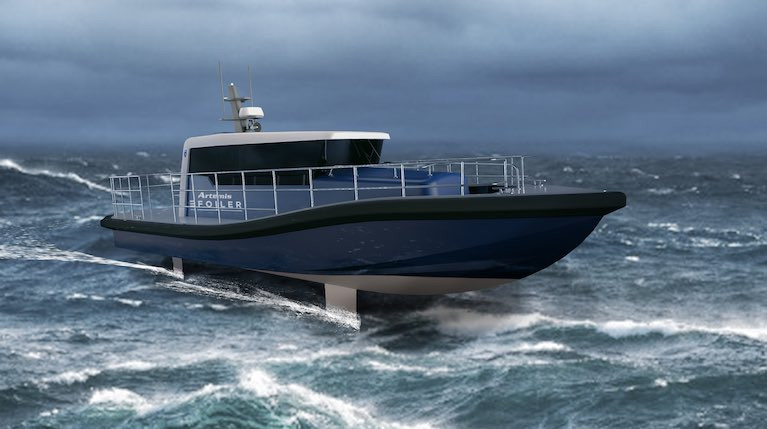Displaying items by tag: eFoiler
Electric Foiling Workboat Concept Unveiled By Artemis Technologies
Belfast Lough based Artemis Technologies has moved to the next phase in the development of its Artemis eFoilerTM electric propulsion system, announcing plans to launch a technology demonstrator in 2021.
Announced by Artemis Technologies COO, Prof. Mark Gillan, during a presentation to the Workboat Association’s Technical Workgroup yesterday, the first vessel equipped with the transformative Artemis eFoilerTM, will be a multipurpose 11m workboat platform, provided by Tuco Marine Group. The workboat will have a cruising speed of 25 kts, a top speed of over 30 kts, and an impressive range of 60 NM at cruising speed.
The core technologies behind the Artemis eFoilerTM include hydrofoils, flight control system, and an electric drivetrain. All elements have been developed and tested in relevant environments. Through combining these core components, this ground-breaking innovation for commercial vessels, that is radically different from existing products under development, will enable a transition to high-speed zero-emission maritime transport.
Prof. Mark Gillan said: “The Artemis eFoilerTM is a truly transformative innovation that will help commercial operators across the world dramatically reduce their carbon emissions. The electric propulsion system provides significant range at high-speed, whilst also reducing operational costs through substantial fuel savings.
“Up to this point, we have carried out extensive design and engineering work on the foils, drivetrain, and control system. Moving into 2021, we are very excited to commence the manufacturing and testing phase and look forward to beginning sea trials later this year.
“The demonstrator will not only prove the concept, but provide an immediate zero-emission propulsion solution for the workboat market.”
Highly scalable, the technology provides a number of additional operational benefits, and will suit a wide variety of vessels and applications including those used in the offshore wind sector, and for passenger transportation.
Prof. Mark Gillan added “The Artemis eFoilerTM enables vessels to fly over the water, providing an exceptionally comfortable ride, without causing any wake or wash.
“This means minimal disruption to the water surface and surrounding area, thereby protecting shorelines and wildlife, while also allowing vessels to travel at high-speed for longer.”
The Artemis eFoilerTM electric propulsion system is a key component of a new class of zero-emission, high-speed ferries being developed by Artemis Technologies in Northern Ireland, as the lead partner in the Belfast Maritime Consortium’s £60 million UKRI Strength in Places Fund programme.





























































